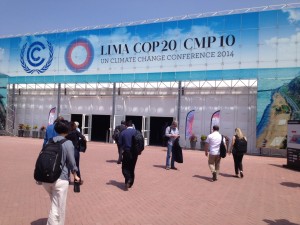Being in Lima, Peru for my eighth COP, UN climate negotiations, with World Council of Churches can sometimes make you feel a bit lost. Even if I been to this before it is hard to grasp the full picture of what is going on. Countries from all over the world have their delegations. They have different forums for different parts of documents that’s lies under the UN framework convention on climate change. And it is easy to get lost in all the details. But still it is important that leaders from all over the world come together and tries to find ways forward to a sustainable future.
The ecumenical presence at the COP makes me glad. We are monitoring the discussions and share all information we pick up. We meet with delegates and delegations to let them know what we think of the negotiations and what we like to see in a new agreement. But we are also present in a march to get the public attention and doing stunts at the venue for the COP and trying to catch a minute of those who runs between different meetings. But we are also present as churches and faith communities that raise the moral and spiritual aspects of climate change as we did today in a side event on climate change and human rights together with Religions for Peace and others.
Still someone might ask; Why? Is this really something that we as churches should do? Has climate change something to do with faith? There is absolutely no reason for not being active in climate change issues.
This is about solidarity and about equity. This is about sharing and intergenerational justice.
Climate change results in different kinds of weather related disasters as storms, flooding and drought. And the most vulnerable are those who contributed least. And in the long run no one will come out as a winner if we don’t turn the curves of emissions and use of natural resources that is still rising. Poor people today, developed countries tomorrow when more and more of the economy will be used for investments in securing infrastructure and other institutions. Not to mention the risk of conflict that stems out of diminishing resources and climate refugees.
The option of the poor is at center of our faith. We got life as a gift and we live in interdependency with a creation that we claim is given by God. Then we have to act for change. Act for transformation of the world to a more sustainable, equitable and peaceful world. But as faith communities we also wants to bring hope. Hope that is something different than prognosis.
St Augustine says about hope “Hope has two beautiful daughters. Their names are anger and courage; anger at the way things are, and courage to see that they do not remain the way they are.”
Faiths can be the carrier of hope and its beautiful daughters, anger over the inequalities and greed that destroys the earth and the possibilities for future generations. Courage to start the transformation needed for a more just and equitable world.
